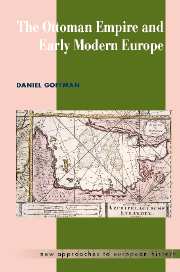Book contents
- Frontmatter
- Contents
- List of illustrations
- List of maps
- Preface
- Acknowledgements
- Note on usage
- Chronological table of events
- The Ottoman House through 1687
- 1 Introduction: Ottomancentrism and the West
- Part 1 State and society in the Ottoman world
- Kubad's formative years
- 2 Fabricating the Ottoman state
- Kubad in Istanbul
- 3 A seasoned polity
- Kubad at the Sublime Porte
- 4 Factionalism and insurrection
- Part 2 The Ottoman Empire in the Mediterranean and European worlds
- Glossary
- Suggestions for further reading
- Index
- NEW APPROACHES TO EUROPEAN HISTORY
2 - Fabricating the Ottoman state
from Part 1 - State and society in the Ottoman world
Published online by Cambridge University Press: 05 June 2012
- Frontmatter
- Contents
- List of illustrations
- List of maps
- Preface
- Acknowledgements
- Note on usage
- Chronological table of events
- The Ottoman House through 1687
- 1 Introduction: Ottomancentrism and the West
- Part 1 State and society in the Ottoman world
- Kubad's formative years
- 2 Fabricating the Ottoman state
- Kubad in Istanbul
- 3 A seasoned polity
- Kubad at the Sublime Porte
- 4 Factionalism and insurrection
- Part 2 The Ottoman Empire in the Mediterranean and European worlds
- Glossary
- Suggestions for further reading
- Index
- NEW APPROACHES TO EUROPEAN HISTORY
Summary
At that time [the reign of Murad I (1362–89)] the tax was low. Conditions were such that even the unbelievers were not oppressed. It was not the practice to seize their purse [clothes?] or their ox or their son or their daughter and sell them or hold them as pledges. At that time the rulers were not greedy. Whatever came into their hands they gave away again, and they did not know what a treasury was. But when Hayreddin Pasha came to the Gate [of the government] greedy scholars became the companions of the rulers. They began by displaying piety and then went on to issue rulings [fetva]. “He who is ruler must have a treasury,” they said. At that time they won over the rulers and influenced them. Greed and oppression appeared. Indeed, where there is greed there must also be oppression. In our time it has increased. Whatever oppression and corruption there is in this country is due to scholars.
We have no real record of the early Ottoman state. Other than a few architectural remains and coins, virtually everything we know about the first overlords (emirs), Osman, Orhan, and Murad, is second-hand. Some of our information derives from Byzantine, Genoese, and other outsider witnesses to the birth of this state; much of it comes from the histories of later Ottomans who reconstructed the past from the jumbled recollections of their elders in order to justify or condemn the Ottoman state as it existed in the fifteenth and sixteenth centuries.
- Type
- Chapter
- Information
- The Ottoman Empire and Early Modern Europe , pp. 27 - 54Publisher: Cambridge University PressPrint publication year: 2002

